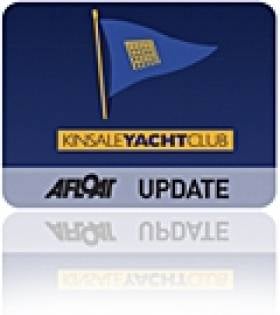Displaying items by tag: Boleros
Quarter Tonners Heading for Sovereigns Cup and ICRA Champs
Up to 25 Quarter Tonners have signed up for Cork harbour's Irish Cruiser (ICRA) National Championships and the Sovereigns Cup in Kinsale – only a week separates the two fixtures. (Latest Sovereigns Cup news here)
The budget-minded class has been back building numbers steadily since 2001 when Peter Morton revived the class on the south coast of England. Now over 40 boats compete in Britain and up to 10 will visit Cork this summer after a successful trial here two years ago.
From June 17th they'll go head to head with a number of hot Irish campaigns that have emerged in the last 12 months, including the host port's "Tiger" (O'Brien, Kenefick and Kenefick), Eamon Rohan's recently refurbished Anchor Challenge and Dún Laoghaire's Supernova, skippered by Ken Lawless.

The crew of Anchor Challenge Complete a gybe. Photo: Bob Bateman
For this year's event, some of these dated 24-26 footers are being pulled from hedgerows and fields rather than building new ones.
Last raced in the 1980s, others are getting the full make-over and have been extensively remodelled for today's IRC handicap rule.
"Budget sailing with five friends, that's the ethos", claims Kinsale skipper Ian Travers about the style of the passe class.
The current fleet contains boats from €6,000 to €30,000, the more expensive boats having extensive optimisation and new sail plans.
It's well within the rules to alter rudders and keels but hull shapes must stay original.
To qualify to race in the Quarter Ton cup, a boat must fall within the old IOR rule or be a production boat derivative. This means many mainstream class-three craft such as Farr 727s, GK24s, Starflash 26s and Boleros all qualify.
Travers reckons therefore a potential Irish fleet could reach 50 boats, if enough owners showed interest.
One boat of particular interest in June will be "Black Fun" a fully refurbished and IRC optimised 1977 Laurie Davidson- designed Quarter Tonner.
Back then she was the top Quarter Tonner in New Zealand but for financial reasons did not make the journey to Finland to compete in the Quarter Ton Cup that year. Now, 34 years later, the current owners are shipping her from New Zealand to compete in this year's cup in Cowes in July but beforehand will compete in both Irish regattas as warm-ups.
And in further good news for the ICRA event a west coast cruiser fleet have confirmed that at least 15 boats will be entering the national championships.





























































